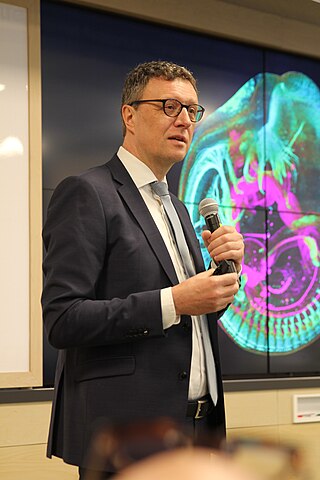Related Research Articles

James Dewey Watson is an American molecular biologist, geneticist, and zoologist. In 1953, he co-authored with Francis Crick the academic paper in Nature proposing the double helix structure of the DNA molecule. Watson, Crick and Maurice Wilkins were awarded the 1962 Nobel Prize in Physiology or Medicine "for their discoveries concerning the molecular structure of nucleic acids and its significance for information transfer in living material".

Cold Spring Harbor Laboratory (CSHL) is a private, non-profit institution with research programs focusing on cancer, neuroscience, plant biology, genomics, and quantitative biology. It is located in Laurel Hollow on Long Island, New York.

William Keith Brooks was an American zoologist, born in Cleveland, Ohio, March 25, 1848. Brooks studied embryological development in invertebrates and founded a marine biological laboratory where he and others studied heredity. His best known book, The Oyster, was first published in 1891 and has been reprinted many times.

Patrick Cramer is a German chemist, structural biologist, and molecular systems biologist. In 2020, he was elected an international member of the National Academy of Sciences. He became president of the Max Planck Society in June 2023.

George Henry Falkiner Nuttall FRS was an American-British bacteriologist who contributed much to the knowledge of parasites and of insect carriers of diseases. He made significant innovative discoveries in immunology, about life under aseptic conditions, in blood chemistry, and about diseases transmitted by arthropods, especially ticks. He carried out investigations into the distribution of Anopheline mosquitoes in England in relation to the previous prevalence of malaria there. With William Welch he identified the organism responsible for causing gas gangrene.

Hans Joas is a German sociologist and social theorist.
A Syracuse dish or Syracuse watch glass is a shallow, circular, flat-bottomed dish of thick glass. Usually, it is 67 mm in outer diameter and 52 mm in inner diameter.

Ecological fitting is "the process whereby organisms colonize and persist in novel environments, use novel resources or form novel associations with other species as a result of the suites of traits that they carry at the time they encounter the novel condition". It can be understood as a situation in which a species' interactions with its biotic and abiotic environment seem to indicate a history of coevolution, when in actuality the relevant traits evolved in response to a different set of biotic and abiotic conditions.

Opecoelidae is a family of trematodes. It is the largest digenean family with over 90 genera and nearly 900 species, almost solely found in marine and freshwater teleost fishes. It was considered by Bray et al. to belong in the superfamily Opecoeloidea Ozaki, 1925 or the Brachycladioidea Odhner, 1905.
Badanaval Venkatasubba Sreekantan was an Indian high-energy astrophysicist and a former associate of Homi J. Bhabha at the Tata Institute of Fundamental Research (TIFR). He was also a Dr. S. Radhakrishnan Visiting Professor at the National Institute of Advanced Studies, Bangalore.
Guru Prakash Dutta was an Indian cell biologist and immunologist, known for his contributions to the subjects of Experimental protozoology and Immunology. His researches are reported to have assisted in the development of a number of anti-malarial drugs. He was an elected fellow of the Indian National Science Academy, National Academy of Sciences, India and Indian Society of Parasitology. The Council of Scientific and Industrial Research, the apex agency of the Government of India for scientific research, awarded him the Shanti Swarup Bhatnagar Prize for Science and Technology, one of the highest Indian science awards, in 1976, for his contributions to biological sciences.
Alok Bhattacharya is an Indian parasitologist, academic and a professor at the School of Life Sciences of the Jawaharlal Nehru University. He chairs the Biotechnology Information System Network (BITSNET) as well as the Life Sciences Expert Committee of FIST program of the Department of Science and Technology (DST). He is an elected fellow of the Indian Academy of Sciences and the Indian National Science Academy and is known for his studies on Entamoeba histolytica and species-specific calcium binding protein and its gene.
Yagya Dutta Sharma is an Indian molecular biologist, professor and head of the department of biotechnology at the All India Institute of Medical Sciences, Delhi. An elected fellow of all three major Indian science academies — Indian National Science Academy, Indian Academy of Sciences, and National Academy of Sciences, India — Sharma is known for his research on the molecular biology of malaria. The Council of Scientific and Industrial Research, the apex agency of the Government of India for scientific research, awarded him the Shanti Swarup Bhatnagar Prize for Science and Technology for his contributions to medical sciences in 1994.
Chinmoy Sankar Dey is an Indian molecular biologist and a professor at Kusuma School of Biological Sciences of the Indian Institute of Technology, Delhi. Known for his research on insulin resistance, Dey's is a J. C. Bose National Fellow of the Department of Science and Technology and an elected fellow of the National Academy of Sciences, India and the Indian National Science Academy. The Council of Scientific and Industrial Research, the apex agency of the Government of India for scientific research, awarded him the Shanti Swarup Bhatnagar Prize for Science and Technology, one of the highest Indian science awards for his contributions to Medical Sciences in 2003. He is also a recipient of the National Bioscience Award for Career Development of the Department of Biotechnology.
Cainocreadium is a genus of trematodes in the family Opecoelidae. It has been synonymised with Apopodocotyle Pritchard, 1966, Cainocreadoides Nagaty, 1956, and Emmettrema Caballero y Caballero, 1946.
Robert Poulin is an evolutionary ecologist specialising in the ecology of parasitism. He is a professor of zoology at the University of Otago and a Fellow of the Royal Society of New Zealand.
William Robin Thompson was a Canadian entomologist and also wrote on the philosophy of science in his book Science and Common Sense: An Aristotelian Excursion (1937). He specialized in the biological control of agricultural and forest insects and served as the head of a laboratory of the Imperial Institute of Entomology which changed its name from the Imperial Parasite Service to Imperial Bureau of Biological Control and later the Commonwealth Institute of Biological Control.
Alan Frederick Cowman AC, FRS, FAA, CorrFRSE, FAAHMS, FASP, FASM is an internationally acclaimed malaria researcher whose work specialises in researching the malaria-causing parasite, Plasmodium falciparum, and the molecular mechanisms it uses to evade host responses and antimalarial drugs. As of May 2024, he is the deputy directory and Laboratory Head of the Walter and Eliza Hall Institute of Medical Research (WEHI) in Melbourne, and his laboratory continues to work on understanding how Plasmodium falciparum, infects humans and causes disease. He was elected as a fellow of the Royal Society in 2011 and awarded the Companion of the Order of Australia in 2019 for his "eminent service to the biological sciences, notably to molecular parasitology, to medical research and scientific education, and as a mentor."
Jessica Gurevitch is a plant ecologist known for meta-analysis in the fields of ecology and evolution.

Joseph Rosen is the Benjamin H. Swig Professor in Optoelectronics at the School of Electrical & Computer Engineering of Ben-Gurion University of the Negev, Israel.